New year, new decade, same industry. Right? Not quite.
The demand for developers is growing fast.
The US Bureau of Labor Statistics predicts that demand for software developers will increase about 25% over the next ten years. And that's just here in the US. Demand in some markets like India, Nigeria, Brazil, and China may be growing even faster.
To further build on this encouraging data, the developer evaluation company I work for, DevSkiller, has compiled this report. It analyzes emerging IT skills and trends for 2020, and what they mean for the developer profession.
For this year's survey, we nearly doubled our sample size. We sifted through and scrutinized 213,782 coding tests sent to developers in 143 countries around the world. From this, we've been able to harness geographical technical hiring insights which shed light on the international flow of tech recruitment.
These coding tests indicate the skills that companies are actively seeking and the locations they are most frequent. We believe that as the years go by, the ability to draw on historical data will be invaluable to follow the patterns upon which they take place.
DevSkiller’s core mission is to give tech recruitment decision-makers the tools and information they need to make the best hires. And we're publishing our analysis for the second straight year so that hopefully our discoveries can help you too.
In this article I'm going to trawl through the dataset and focus the spotlight on some noteworthy findings that we discovered.
Companies from Israel are the most selective
The results from our report this year have confirmed companies from Israel are the most selective. Companies in Israel consider only 12.26% of the developers they test.
If you take a coding test, developers from different countries tend to get different scores. At the same time, not all employers are as picky with the candidates that they hire. Why is this?
As much as we are a global society, countries worldwide hold their candidates to a range of contrasting standards. The location where you are being assessed can ultimately have an effect on how you will be held to account.
Indeed, a recruiter in Israel could be looking for something in a candidate that a recruiter in the US might not deem too important.
Supply and demand could also play a role. For any job opening, there might be a large number of applicants for a position with only a few roles available. This, in turn could influence a recruiter’s behavior.
An individual’s IT skills are just the beginning for some employers.
As the Israeli economy is largely scientific and technological based, their selective nature doesn’t come as much of a surprise. The Israeli labor market demands a high degree of education in software engineering and development so companies naturally seek a competitive edge.
Last year, Singapore was the most selective at almost 20%, and they're down to around 17% this year. They still remain in the top five due to their world-class level OECD rankings for education.

72% of companies are looking for JavaScript developers and JS is the most popular IT skill developers are tested in (40%)
JavaScript is officially the most in-demand IT skill of 2020.
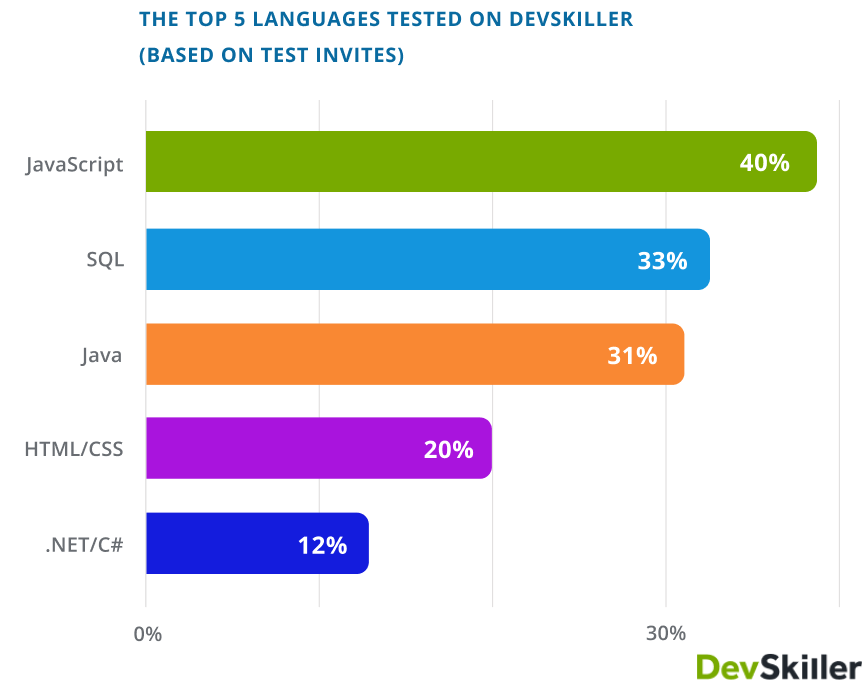 A chart showing 40% of tests on DevSkiller were in JavaScript - followed by SQL, Java, HTML/CSS and .NET/C#
A chart showing 40% of tests on DevSkiller were in JavaScript - followed by SQL, Java, HTML/CSS and .NET/C#
This discovery is noteworthy, for in 2019, Java held the top spot for this special honor.
What this finding proves is that there is an irresistible demand for developers working on web applications. It will be interesting to note whether this fact is part of an ongoing trend or if it is a statistical anomaly.
Stack Overflow’s 2019 Developer Survey shares a similar view, which found JavaScript to be the most popular language among professional developers. It’s no wonder why it topped our list of IT skills this year.
JavaScript, SQL, and Java still hold the top three spots from last year, affirming the notion that the needs of companies have remained fairly steady.
While Java is historically the most tested language, it is not in the top two technical skills that most companies are looking for this year.
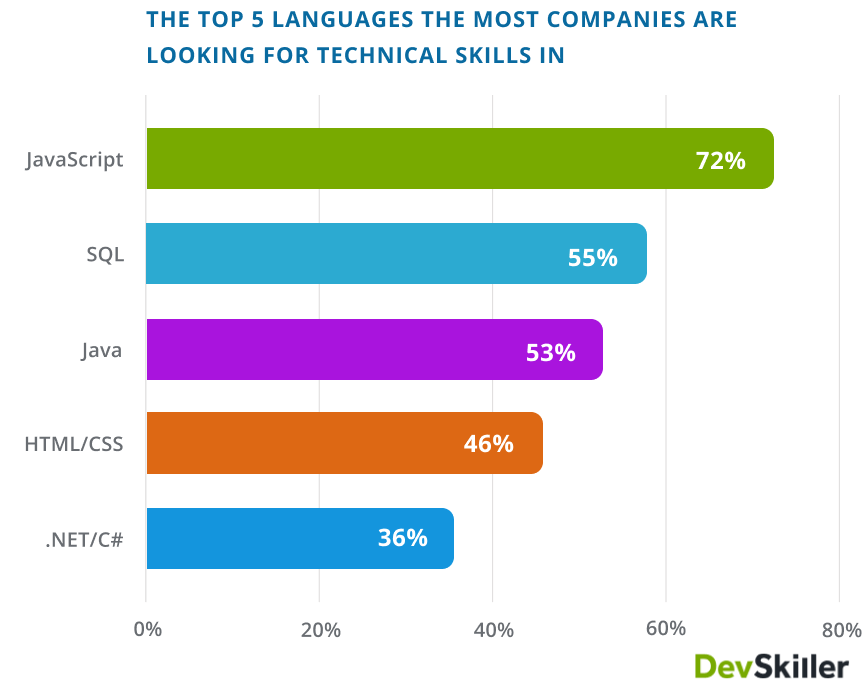 A chart showing JavaScript is the most widely sought technical skill by companies, followed by SQL, Java, HTML/CSS and .NET/C#.
A chart showing JavaScript is the most widely sought technical skill by companies, followed by SQL, Java, HTML/CSS and .NET/C#.
What is clear is that a growing number of companies of different sizes are seeking developers with JavaScript technical skills. Database IT skills are important for back-end and front-end developers so it makes sense that SQL has remained in second place. Front-end skills like HTML and CSS place fourth.
GitHub’s The State of the Octoverse further confirms JavaScript’s place among the front-end IT’s elite with the top spot in their report. SQL on the other hand, remains the premier database IT skill, in line with our findings.
As W3Techs (Web Technology Surveys) highlights, JavaScript is the most popular client-side language as it’s prevalent in 95% of all websites. A staggering number.
What we can conclude from this data is that thanks to the ubiquity of web browsers, JavaScript is still the most in-demand IT skill in the world.
React, Spring, ASP.NET, MySQL, HTML, Data Analysis, and Laravel are the most popular technologies in their respective tech stacks
Since our tests were created with the tech stack in mind, we are able to see what the most popular IT skills, resources, and technologies are in their respective stacks.
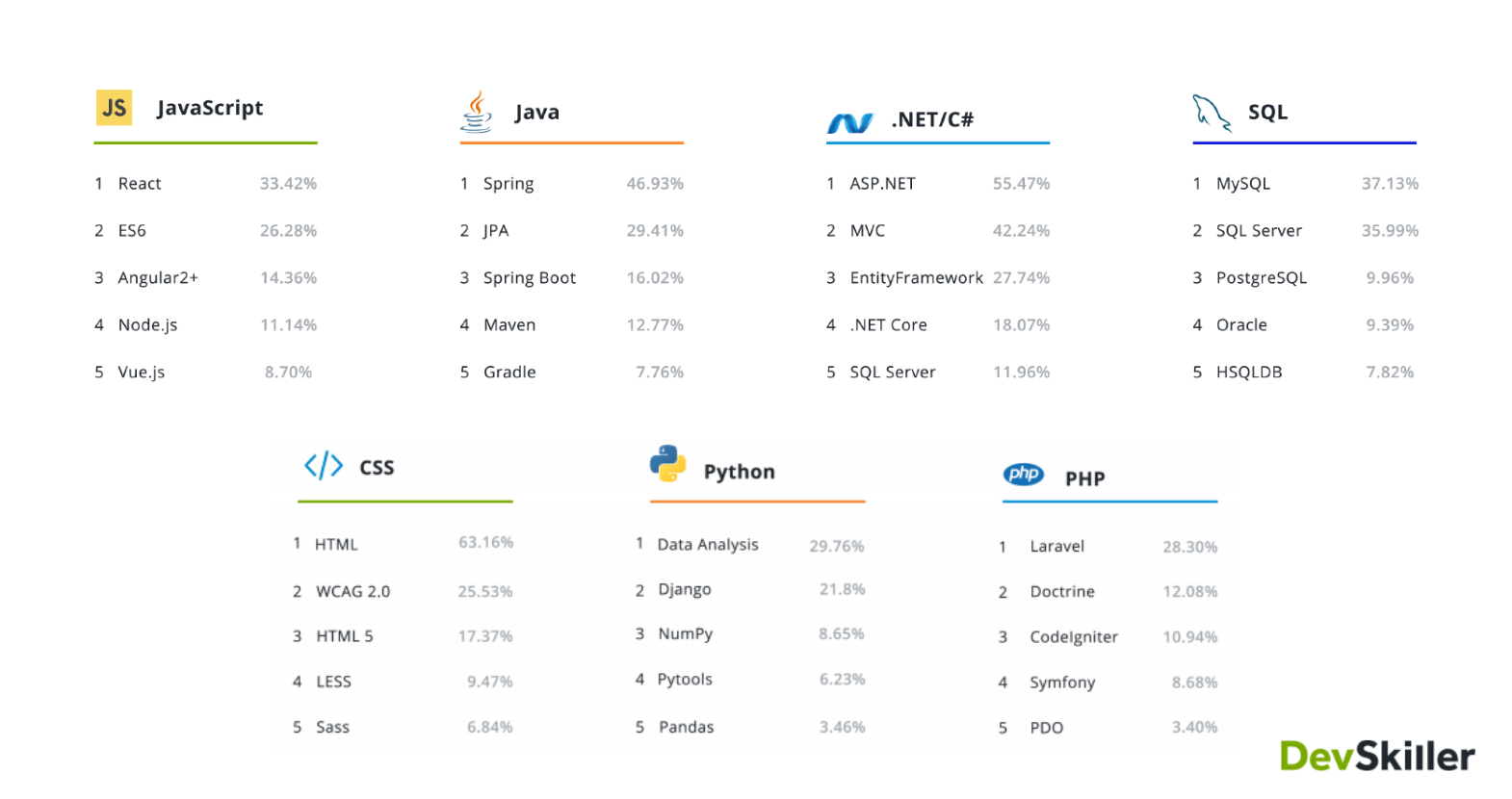 Rankings for different libraries and frameworks for the most popular programming languages.
Rankings for different libraries and frameworks for the most popular programming languages.
React has topped the list of hiring trends at Hacker News for a few years now, so it’s no surprise to see it at the top of the JavaScript rankings.
Spring is the most resourced tool in the Java tech stack with JPA and Spring Boot coming in second and third.
ASP.NET, the popular web app framework is the most used technology in the .NET tech stack. MVC architecture and Entity Framework are used in 42% and 28% of the tests respectively.
There’s a pretty even split in the database field. MySQL is used in almost 40% of SQL tests while SQL Server is used in about a third.
HTML figures strongly in the CSS tech stack, as CSS and HTML are closely intertwined. The most notable observation is that HTML is still tested as a separate entity. This indicates that while it might be easy to learn, it does require specialist skills to master.
Data science is a major application for Python so it makes sense that Data Analysis is the most common IT skill in that stack.
Laravel is by far the strongest resource in the PHP stack. The others on the list, Doctrine, CodeIgniter, Symphony, and PDO, were only used in relatively small percentages of all PHP tests.
The US is the largest international recruiter but is only the 4th largest labor market for overseas recruitment
For a second year running, the US tops the list as the largest international recruiter in the tech space. In our report last year, we found that bigger countries like the US do a lot of external technical hiring while also being a major global talent pool.
This year, that last excerpt now has an asterisk attached.
The US is no longer second in the world in regards to providing foreign countries with tech professionals. India, Brazil and Egypt occupy the podium spots, with the US coming in fourth.
The US recruits most heavily from countries such as India and Egypt. This effectively boosts these countries’ rates from the sheer amount of tech jobs available in the US.
A reportby the Economic Times stated that the overall hiring intention of Indian IT employers fell around 6% for the period between October 2019 and March 2020. This figure is a key indicator as to why Indian IT professionals have been looking abroad for their next career opportunity.
Interestingly though, there was a decline in the amount of interest Indian employers had in US tech listings. Despite this notable decline, Indians are still the largest source of foreign job clicks in the US by some margin. The US labor market has grown stronger this past year, despite initiatives from its current administration to restructure immigration.
What we see is in addition to an efficient allocation of IT skills among developed economies, there is a growing importance of outsourcing-focused countries.
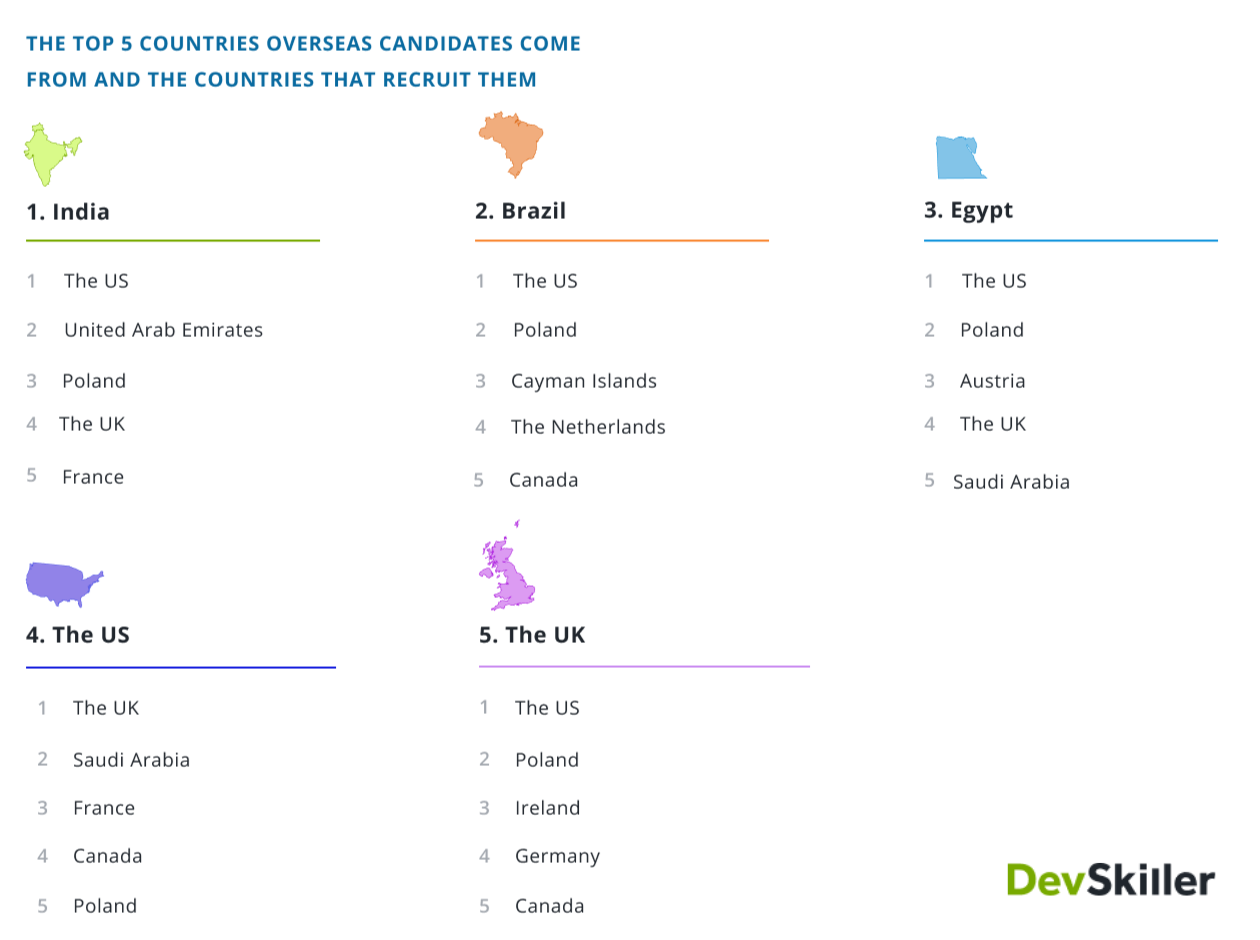 A chart showing several major developer markets and which countries their overseas candidates come from
A chart showing several major developer markets and which countries their overseas candidates come from
Latvian developers score the highest (54.65%) on coding tests
There must be something in the water in Latvia, with the Baltic country taking first place among all appraised countries from our coding tests.
In 2019, DevSkiller tested over 140 countries to find out whose knowledge reigned supreme.
European countries in general scored fairly well, holding six out of the top ten spots. Latvia improved on last years result by a remarkable 13%.
So what gives rise to this sudden Latvian supremacy? Is it education, the ease of testing, or a bit of both? New Zealand has been able to effectively attract global talent, the same can’t be said of their Baltic counterparts. Does it really mean Latvians have the world’s best IT skills?
The standard of testing could be a factor, with Latvian recruiters potentially offering candidates more manageable assessments. It is also partially explained by their education and political system, who have put high value on the IT sector in general.
The region, along with tech-friendly Estonia, have created a fast-moving tech environment that the rest of the world is beginning to take notice of. Let’s see if they are able to keep it up.
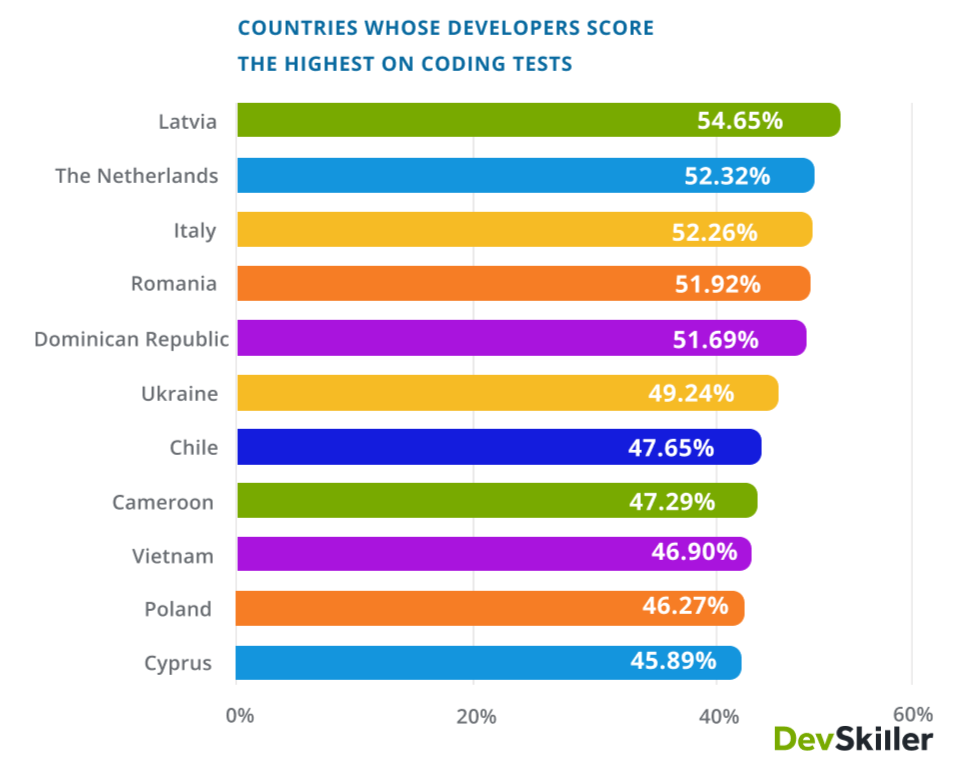 A chart showing that Latvian developers score the highest on tests, followed by The Netherlands and Italy.
A chart showing that Latvian developers score the highest on tests, followed by The Netherlands and Italy.
Most developers will get a JavaScript IT skills assessment, regardless of their main focus
Well, what a surprise to see JavaScript pop up on this list once again.
2020 could be aptly named year of the JavaScript the way things are going.
We ran the rule over the top eight language pairs tested together this year and discovered that there was a bit of a shake up. The JavaScript + CSS pairing took over the mantle as the most popular combination, with last year’s winner, JavaScript + SQL coming in third.
This shows the importance of front-end skills with JavaScript being paired with CSS and HTML. Together, these technical skills make up the foundation of a solid front-end development stack.
Following on from last year’s trend, SQL has retained four entries, indicating the significance of database technical skills in addition to the main skill set needed for that role.
It proves for a second year running that in full-stack development, a combination of IT skills are evidently required. JavaScript on the front-end combined with SQL to compliment a server-side tech stack.
As the StackOverflow editors plainly state it, “JavaScript is the most commonly used programming language on earth.”
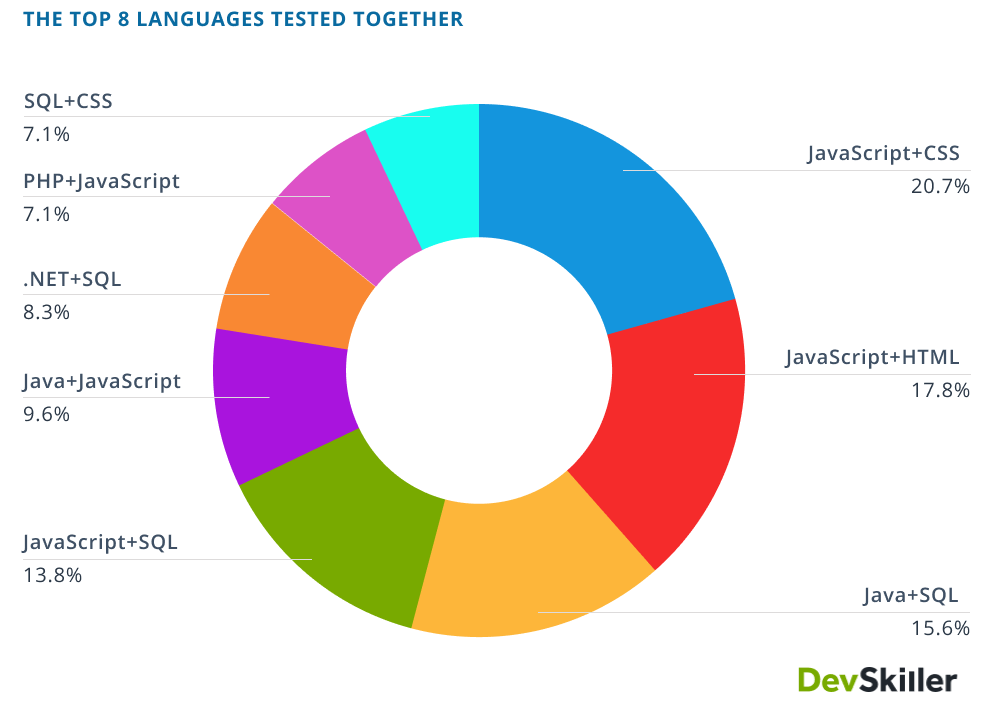 A chart showing which languages were tested together.
A chart showing which languages were tested together.
What this means for next year and beyond
While this data was compiled over the past year, it holds some interesting insights for the year ahead.
- The labor market in the US is still growing, and along with it the amount of opportunities for IT professionals – though, it might be a little more complicated for those without a US passport.
- Israel is home to, by far, the most selective companies when it comes to hiring those with IT skills.
- JavaScript is not going anywhere, and the legacy technology’s popularity and demand only seems to be rising.
- Countries like India and Egypt may begin to source more foreign talent.
- Familiarity with database languages such as SQL will go a long way.
These are just some of the findings in the report. Check out the full Devskiller Global Technical Hiring & Skills Report if you want to get the complete picture of these insights and more
@Credits: FreeCodeCamp



























